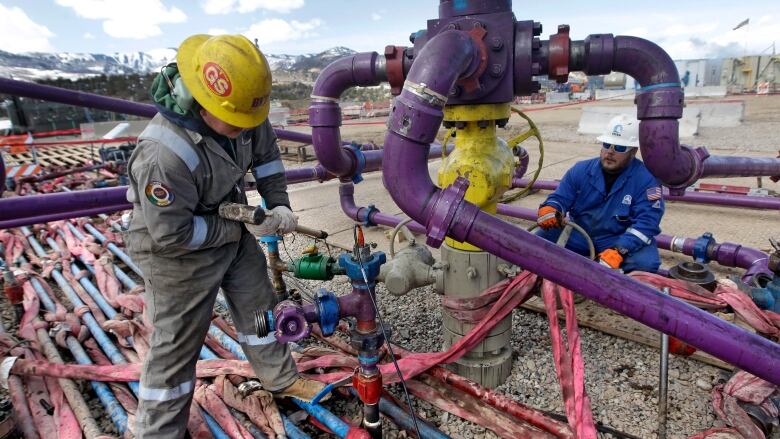Fracking-induced earthquakes could leave workers vulnerable, says geophysicist
Seismic scientist David Eaton says Canada's fracking-induced quakes are the biggest in the world

A leading seismic scientistsays B.C.'s energy infrastructure and gasfield workers may be vulnerable to earthquakes caused by fracking.
Earthquakes triggered by fracking have been felt in Fort Nelson and Fort St. John, but University of Calgary geophysicist David Eaton says the shaking is strongest in remote areas near fracking sites.
"Certainly in the immediate area where there's infrastructure established by the oil and gas industry, including pipelines and well bore casings, then it's something that really requires some careful analysis," said Eaton.
- INTERACTIVEHowfrackingworks
- Frackingtriggered 2014 earthquake in northeastern B.C.
- Frackinghalted after 4.6-magnitude earthquake in B.C.
Fracking, the common name for hydraulic fracturing, isthe process of injecting water, sand and chemicals at high pressure deep underground to break rock and free gas.
New research showsfracking-inducedquakes are shallow, so they trigger stronger ground motion and shaking potentially damaging in places without much earthquake preparedness.
Eaton,part of a national research network looking into "induced seismicity" earthquakes caused byfrackingin northern B.C. and Alberta,says energy regulators are taking the issue "very seriously."
The quakes are hitting far from cities and towns, he said, but pipelines, gas wells and workers atfrackingsites are all vulnerable.
"If people are being shaken up by ground motions, then it makes it a matter of public concern," he said.
WorkSafeBC spokeswomanTrish Knight Chernecki saidshe's not aware of any workplace injuries caused by seismic activity.
"Our officers in the northeast of B.C. continue to inspect oil and gas workplaces and hold employers accountable for the health and safety of their workers including maintaining the safety of industry infrastructure," she said.
Fracking triggered 2014 quake
Eaton's concerns come amid the news that frackingtriggered a4.4-magnitude earthquakein northeastern B.C. last year,one of world'slargest earthquakesever linked to the controversial process.
The 4.4-magnitude quake was felt in Fort St. John and Fort Nelson in August 2014. It was preceded by a 3.8-magnitude earthquake in late July, also caused by fracking.
In January, Alberta's energy regulator reportedfrackinglikelycaused a 4.4-magnitudeearthquake in the northern townof Fox Creek.
Meanwhile, B.C.'s Oil and Gas Commissioncontinues to investigate whether a 4.6-magnitude quake only three kilometres from a fracking site was triggered by hydraulic fracturing this month.
Why is Canada different?
Eaton saidthefracking-related earthquakes seen in Canada are different fromthose felt in theU.S..In the U.S., larger earthquakes have been triggered but they're due to disposal of fracking wastewater, notfracking itself.
"Of all the induced earthquakes that are directly related to hydraulic fracturing, the ones we're seeing in WesternCanadaare certainly at the top," saidEaton.
"Worldwide [these quakes are] the highest magnitudeevents that are attributed to hydraulic fracturing anywhere in the world."
Research is ongoing into why such large quakes are being triggered in Canadaby fracking alone.
"It's much different in Western Canada than in Oklahoma and Kansas why is it different? That's the topic of intensive research.It'stoo early to say right now."












_(720p).jpg)


 OFFICIAL HD MUSIC VIDEO.jpg)
.jpg)



























































































